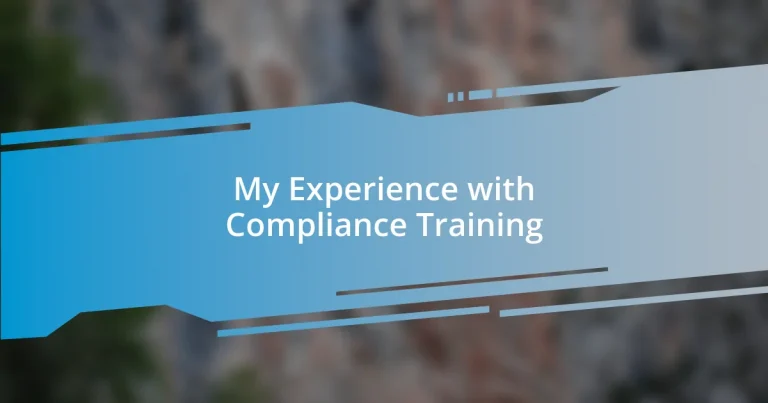Key takeaways:
- Compliance training fosters a culture of trust and accountability, empowering employees to contribute to a safe working environment.
- It emphasizes shared responsibility, highlighting that every individual’s actions impact the organization as a whole.
- Challenges in compliance training, such as dense material and varying levels of prior knowledge, can hinder effective learning and engagement.
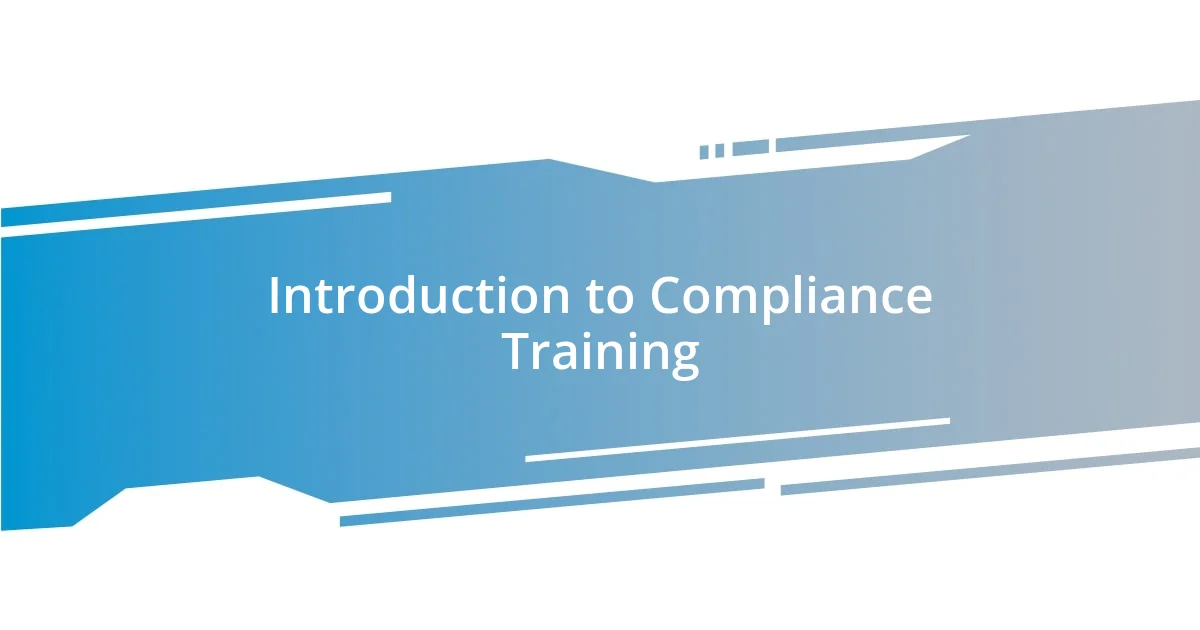
Introduction to Compliance Training
Compliance training is essential in today’s business world, ensuring employees understand the laws, regulations, and company policies that govern their actions. I remember my first compliance training session; it felt overwhelming but necessary, like preparing for a crucial exam. Why is this training so vital? Because it protects both the organization and its employees from potential legal issues and ethical breaches.
As I sat there, trying to absorb the mountain of information, I couldn’t help but think about the broader implications of compliance. It’s not just about ticking boxes; it’s about fostering a culture of integrity within the workplace. Have you ever reflected on how compliance can shape an organization’s reputation? It’s a topic that often gets overlooked, but the truth is, a strong compliance program can enhance trust and accountability among staff.
In my experience, compliance training acts as a source of empowerment rather than just a requirement. Armed with knowledge, I felt more prepared to face challenges and navigate ethical dilemmas. I believe this is where the emotional aspect comes into play—understanding that compliance isn’t just about rules, but about creating a safe environment for everyone involved. How did compliance training change your perception of your workplace? For me, it transformed my role from just an employee to a steward of our company’s values.
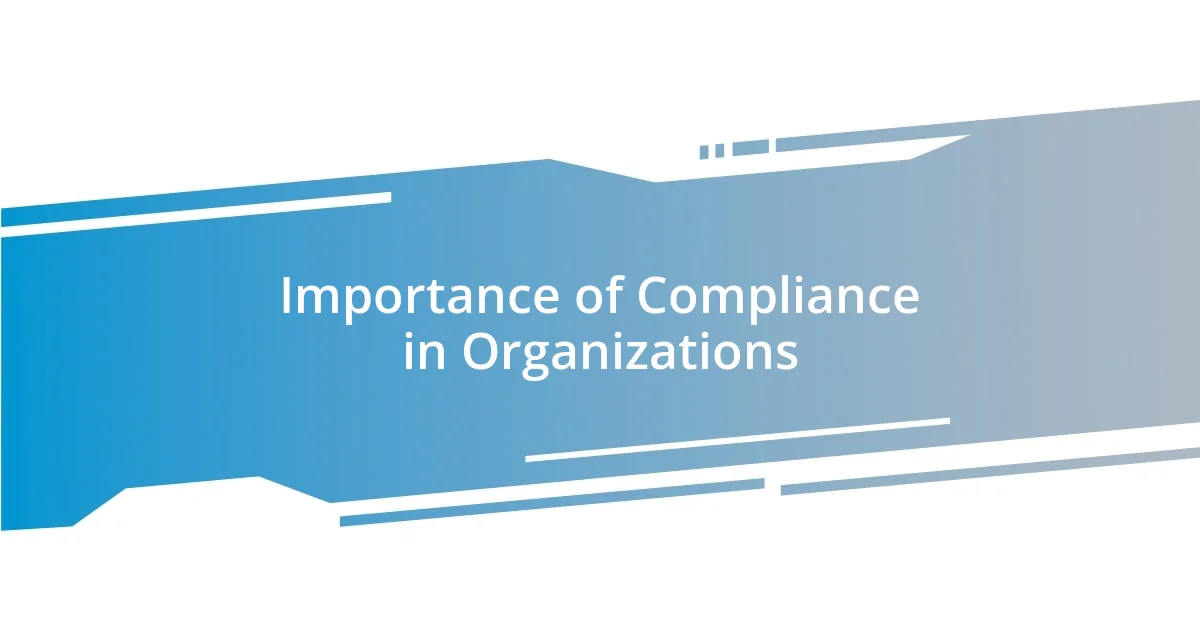
Importance of Compliance in Organizations
Compliance isn’t just a box to tick; it’s a fundamental aspect of any organization. I’ve seen firsthand how effective compliance practices can avert significant legal headaches. There was a time when a colleague faced serious issues due to a lack of understanding of regulations, and it reinforced how crucial it is to stay informed. Imagine being in a position where a single misstep could jeopardize your entire organization—it’s a heavy weight on the shoulders of every employee.
One of the more surprising benefits of strong compliance is how it can foster a culture of trust. I remember discussing our compliance policies during a team meeting, and the shift in atmosphere was palpable. People felt encouraged to speak up without fear of repercussions, knowing that there were guidelines to protect them. This transformative effect can enhance teamwork and collaboration, making the workplace not just a job site, but a community of shared values.
Moreover, compliance paves the way for sustainable business operations. I’ve noticed that organizations prioritizing compliance often enjoy heightened employee morale and productivity. There’s a sense of shared responsibility and pride in doing things the right way. When everyone is on the same page with compliance, it strengthens the foundation of the workplace. It’s empowering to know that my actions contribute to a larger purpose, creating a safe environment for all.
| Benefits of Compliance | Impact on Organizations |
|---|---|
| Averts legal issues | Reduces risk of costly fines |
| Builds trust among employees | Enhances teamwork and morale |
| Promotes ethical behavior | Strengthens organizational culture |
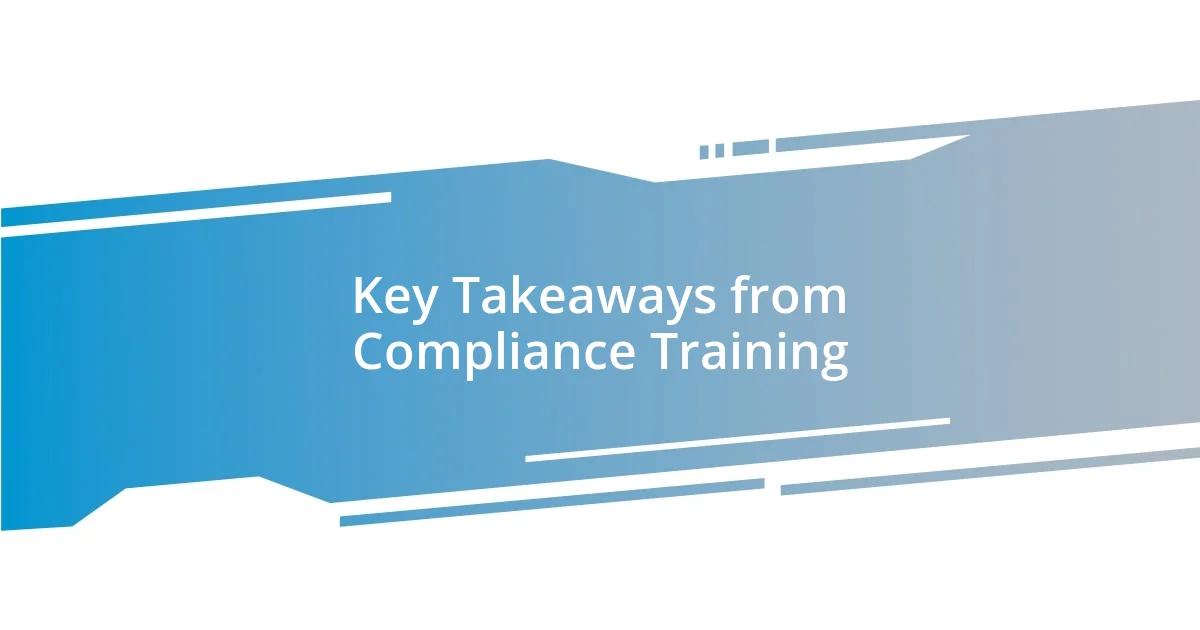
Key Takeaways from Compliance Training
One of the most significant takeaways from compliance training is the realization of shared responsibility. I remember a specific instance during a training module when we were tasked with analyzing case studies of ethical dilemmas. It felt profound; I saw how compliance issues weren’t just abstract concepts but real scenarios that could affect my colleagues and our clients. This shifted my perspective—compliance wasn’t solely the job of management; it was something I actively participated in.
- Compliance is a collective effort, emphasizing that every individual’s actions matter.
- It encourages employees to understand the impact of their choices on the organization as a whole.
- When everyone is involved, it fosters a strong sense of community and accountability.
Another important point to consider is how compliance training often reveals personal growth opportunities. During my training, I found myself reflecting on my values and how they aligned with our company’s mission. There was a moment when I realized that compliance wasn’t just about following rules; it was about standing up for integrity. This gave me a sense of purpose that I hadn’t anticipated, connecting my daily work to a larger commitment to ethical conduct.
- Compliance training helps employees identify their personal values in relation to company ethics.
- It cultivates confidence in making ethical decisions, knowing the organization supports those choices.
- The emotional connection to compliance can lead to a more passionate and engaged workforce.
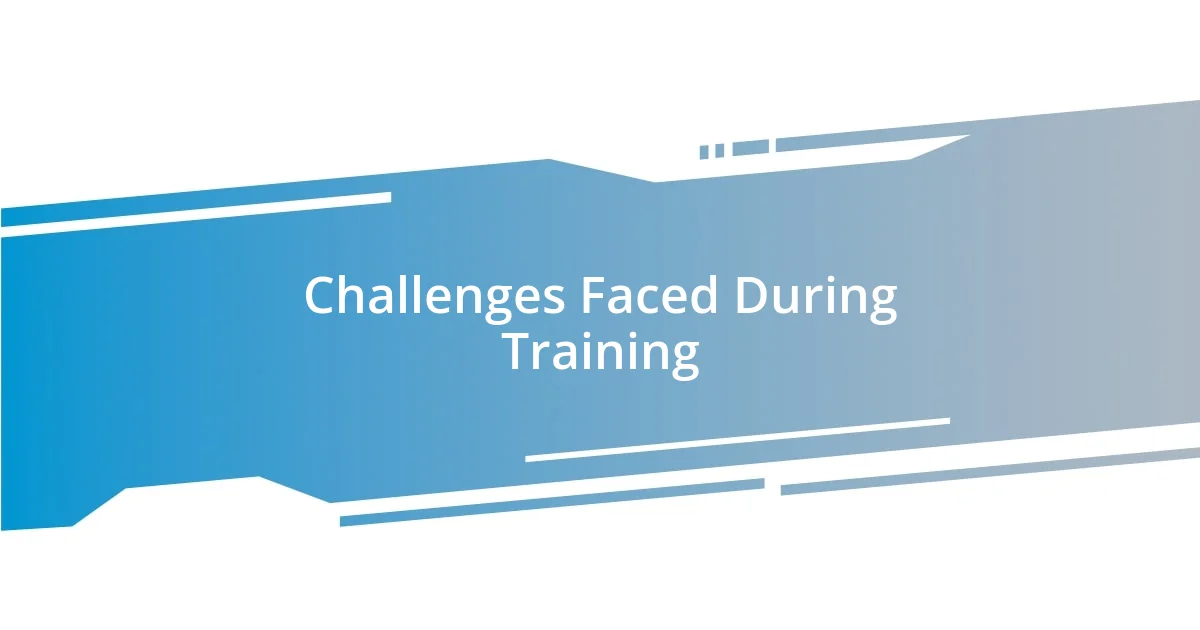
Challenges Faced During Training
Navigating the waters of compliance training isn’t always smooth sailing. I remember sitting through a session filled with dense regulations and complex terminologies; it felt overwhelming. Have you ever struggled to absorb information when it’s thrown at you all at once? I found myself zoning out, realizing that if I was feeling this way, many of my colleagues likely were too. It’s a challenge to remain engaged with content that can often feel abstract and disconnected from our daily tasks.
Another hurdle I encountered was the varied levels of prior knowledge among participants. Some team members had extensive backgrounds in compliance, while others, like myself, were brand new to the concepts. It often created an unspoken divide. I recall one discussion where a seasoned colleague effortlessly navigated through compliance jargon, and I felt lost. It made me wonder: how do we bridge that gap and support one another? Having open conversations about our different experiences could be key in fostering a more inclusive learning environment.
Finally, time constraints always loomed large during training sessions. The schedule was packed, and there were moments when crucial topics were rushed through just to meet deadlines. I still remember a day when we skimped on a vital discussion around real-life compliance failures. It left me thinking—are we truly learning if we can’t dive deep into these lessons? It’s essential to allow enough time to absorb and reflect on the material fully. After all, compliance isn’t just a checklist; it’s about understanding and internalizing principles that guide our actions every day.












